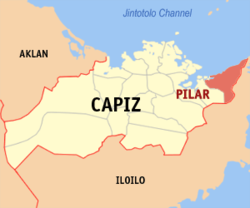Pilar, Capiz
|
Pilar Sibala |
|
|---|---|
| Municipality | |
 Map of Capiz with Pilar highlighted |
|
| Location within the Philippines | |
| Coordinates: 11°29′N 123°00′E / 11.48°N 123°ECoordinates: 11°29′N 123°00′E / 11.48°N 123°E | |
| Country | Philippines |
| Region | Western Visayas (Region VI) |
| Province | Capiz |
| Legislative district | 1st district of Capiz |
| Barangays | 24 |
| Government | |
| • Mayor | Rita Lyn B. Patricio |
| Area | |
| • Total | 77.99 km2 (30.11 sq mi) |
| Population (2015 census) | |
| • Total | 45,287 |
| • Density | 580/km2 (1,500/sq mi) |
| Time zone | PST (UTC+8) |
| ZIP code | 5804 |
| IDD : area code | +63 (0)36 |
| Website | www |
Pilar is a third class municipality in the province of Capiz, Philippines. According to the 2015 census, it has a population of 45,287 people.
Pilar is politically subdivided into 24 barangays.
The coastal town sprang out from an Austronesian settlement in the early 16th century when indio natives managed to escape oppression from Spanish colonial authorities. The settlement was then known as Sibala, named after the river that ran through the coastal village. In 1570, however, the settlement was seized by Spanish forces and the guardia civil took full control of the village fortifying it with a military garrison. It later flourished into a bigger town and was renamed after its designated patron La Nuestra Señora del Pilar (Our Lady of the Pillar). In the 18th century, it adopted the (Holy Trinity) La Santisima Trinidad as its municipal patron after a wooden image of the Holy Trinity from the wreckage of a Spanish galleon ship en route from Mexico was found in the town's coastline. Augustinian friars were initially assigned to preach in the town since then until it would later receive its permanent parish priest and Roman Catholic Church.
In 1887, there had been an armed insurgency known as the Battle of Balisong during the Philippine Revolution in an attempt to overthrow Spanish authorities in the municipality led by local revolutionaries with the support of other resistance groups in Capiz, namely from the neighboring towns of Pan-ay and Pontevedra.
In 1949, the sitios and barrios of Aranguel, Culilang, Pandan, Pinamihagan, Cadoulan, Quiajo, Sangcal, Pondol, Marita, Madulano, Jabuyana, Bo-ac, Cabugcabug, Goce Badiangon, Bayuyan, Agbobolo, Cubay, Ibaca, and the sitio of Lotudlotud, which was converted into a barrio of Elizalde, were separated from the municipal jurisdiction of Pilar to form a separate town, namely President Roxas, by virtue of Republic Act No. 374.
In the 2015 census, the population of Pilar, Capiz, was 45,287 people, with a density of 580 inhabitants per square kilometre or 1,500 inhabitants per square mile.
...
Wikipedia

